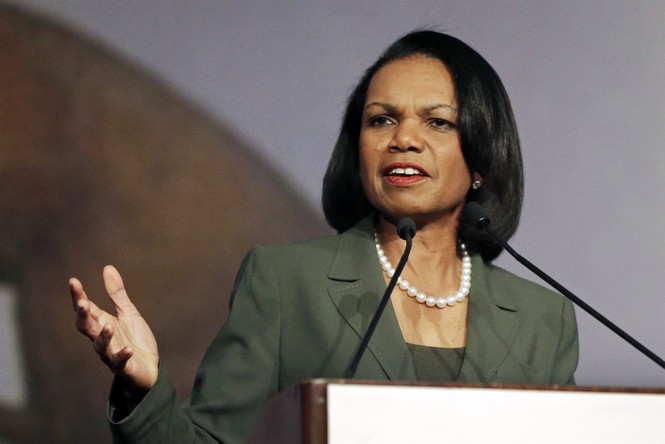Former Secretary of State Condoleezza Rice and historian David Kennedy joined Hugh Hewitt to discuss "American Creed," a PBS series Rice and Kennedy collaborated on answer the question, "What does it mean to be an American?"
During the interview, Hewitt brought up the Marjory Douglas Stoneman High School shooting and asked Rice to recount her experiences of living in Birmingham during the racial attack on the 16th Street Baptist Church in Birmingham, Alabama.
Rice compared and contrasted the two scenarios and provided advice to the students as they moved forward.
Here's what was said (emphasis mine):
Hewitt: Let me pause for a moment on the problem of violence in young people, Dr. Rice. I remember your book, Extraordinary Ordinary People, your memoir of growing up in Birmingham, which was known as Bombingham. And I thought this past week after the tragedy in Parkland and the shooting at the high school that you are no stranger to violence as a young person. You were down the street when the Birmingham bomb went off, as I recall, right? Did you feel that bomb go off, the one that killed the little girls?
Rice: We did. I was, it was a Sunday morning. We were at church at my father’s church, which is about two miles as the crow flies from 16th Street Baptist Church. And the church shook. And in those days, because Birmingham had been such a violent place, you knew immediately that a bomb had gone off. And so yes, we felt it, and we felt the reverberations through the community of the loss of four little girls, one of whom I had gone to kindergarten with, Denise McNair. And it’s something you never quite forget.
Hewitt: So what do you say to the young people who were traumatized by this violence, and they are. I mean, they have every right to their opinion. They have every right to any way they want to express it. But what do you say to them about getting through this?
Rice: I think, first of all, the communities have to pull together. One of the things that Birmingham had going for it, even in those most violent days, was that the adults in the community were determined that the children were not going to be, that our future was not going to be determined by the ugliness of Birmingham. And they both challenged us to work hard. You have to be twice as good, my parents used to say. But they also told us we love you, and we were a community in which faith and family and education was preeminent. I know that it’s hard to go through something like these young people have just gone through. But I hope that the community is working with them to say if you will be, you will be in a better place, just work through this, and commit to your country, commit to your community, commit to making the situation better for each other.
Hewitt: I also look to you for a rather nuanced view on self-defense, because I recall from your autobiography your father would sit on the porch at night with a gun across his lap because he would not adopt a non-violence if they were coming for his family.
Rice: That’s correct. As a matter of fact, Birmingham was the jurisdiction of a man named Eugene “Bull” Connor, who was the police commissioner. And I remember so well bombs going off in our neighborhood one night, and my father said, he put everybody in the car and we’re going to go to the police. And my mother said the police probably set that bomb off. And that’s the way that our community, therefore, the men in our community, protected us. And I think it’s a pure version of the Second Amendment, as a matter of fact, the right to bear arms. I will say this, Hugh. I think it is time for us to have a conversation about what the right to bear arms means in the modern world. I don’t understand why civilians need to have access to military weapons. We wouldn’t, we wouldn’t say you can go out and buy a tank. So I do think we need to have that conversation. But I believe that the rights that we have in the Constitution are indivisible. We can’t throw away the Second Amendment and keep the 1st.
Recommended
Click here to listen Hugh Hewitt's full audio interview with Condoleezza Rice.

A Changing Political Landscape
Rice's comments seem to be representative of a new point of view that is emerging and becoming more vocal. Most Americans who are not hardcore gun rights activists or proponents of gun control find themselves walking the line between the two groups (or "extremists" as they'd probably refer to the other two sides).
This new group of people, who find themselves in the middle of the gun control debate, see mass shootings, like what took place in Parkland, Florida, and want politicians to address the problems but they also know that the Second Amendment is one of the greatest things that make America different from every other nation in the world.
The question becomes: what portion of our society walks this middle ground and what can be done to make sure all three sides are happy?

























Join the conversation as a VIP Member